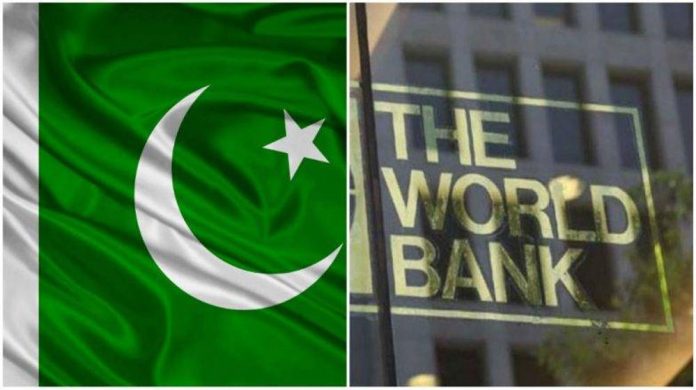Muhammad Aurangzeb, the Finance Minister of Pakistan, attended a significant meeting hosted by the World Bank in Washington DC.
The main highlight of this meeting was a report that lays out a roadmap for Pakistan’s economic future. According to this report, Pakistan has the potential to transform into a high-middle-income country by the year 2047.
The report predicts a remarkable growth in the country’s economy, projecting it to surge from its current size of US$ 300 billion to an impressive US$ 3 trillion.
During his participation, Aurangzeb praised the World Bank’s strategic focus on critical global issues such as climate change, digitalization, and human development.
He expressed that these areas are also top priorities for Pakistan’s government. He particularly appreciated the World Bank’s initiative to streamline its operations by adopting a single platform, which is expected to enhance the efficiency and effectiveness of its work.
In addition to the World Bank meeting, Aurangzeb engaged in discussions with representatives from Moody’s Investor Service.
In this meeting, he provided an overview of Pakistan’s economic progress and stabilization efforts, particularly highlighting the positive outcomes achieved under the Stand-by Arrangement (SBA) with the International Monetary Fund (IMF).
He elaborated on the government’s strategic priorities, including comprehensive tax reforms, energy sector restructuring, and the privatization agenda.
Aurangzeb also shared the government’s intentions to explore opportunities in international capital markets, with a specific focus on attracting investments from the Middle East and China to support Pakistan’s economic growth trajectory.
During these discussions, Aurangzeb addressed various economic concerns raised by Moody’s, such as inflation rates, foreign exchange reserves, debt management, and the overall stability of Pakistan’s external and domestic financial landscape.
He expressed confidence in the government’s capacity to tackle these challenges and reaffirmed its commitment to implementing both short-term and long-term reforms that foster sustainable economic growth.
Aurangzeb conveyed his optimism regarding a potential credit rating upgrade by Moody’s, reflecting the country’s strengthened economic fundamentals and the government’s proactive reform agenda.
Apart from the meetings with international financial institutions, Aurangzeb actively engaged with potential investors during a roundtable session.
He showcased Pakistan’s stable macroeconomic indicators and outlined the government’s reform agenda, emphasizing the country’s decreasing inflation rates, stable currency value, robust agricultural sector growth, strong remittance inflows, and increasing foreign exchange reserves.
These positive economic indicators served as a testament to Pakistan’s improved economic outlook and created a conducive environment to attract potential investment opportunities. Aurangzeb also expressed the government’s intention to extend its collaboration with the IMF, building on the success of the existing Stand-By Arrangement (SBA).
During his visit, Aurangzeb also met with Sultan Abdulrahman Al-Marshad, CEO of the Saudi Fund for Development (SFD). They discussed potential avenues for strengthening economic cooperation between Pakistan and Saudi Arabia, reviewing the progress of ongoing development projects and exploring future investment opportunities, including funding for major infrastructure projects like the Diamer Bhasha Dam and the N-25 highway.
Additionally, Aurangzeb held a meeting with Andrew Mitchell, the UK’s Minister of State for Development and Africa. They acknowledged the long-standing and cordial relations between Pakistan and the UK, rooted in shared history and mutual understanding.
Aurangzeb expressed gratitude for the UK’s continuous support in various sectors, including education, healthcare, financial management, and governance.
He briefed Mitchell on Pakistan’s favorable economic indicators and strategic priorities, inviting British International Investment (BII) to explore potential investment opportunities in Pakistan.
Furthermore, Aurangzeb met with officials from Citibank to discuss Pakistan’s economic achievements, including the successful repayment of a Eurobond and ongoing discussions with the IMF regarding a larger and extended support program.
He highlighted the government’s commitment to implementing key reforms in areas such as taxation, energy sector overhaul, and state-owned enterprise (SOE) reforms to foster economic growth and attract foreign investment.
Muhammad Aurangzeb’s active participation and engagements during the IMF and World Bank’s 2024 Spring Meetings in Washington DC reflect Pakistan’s commitment to strengthening its economic partnerships, attracting foreign investments, and achieving sustainable economic growth.
He is leading Pakistan’s delegation at these high-profile meetings, which also includes other key officials from Pakistan’s finance and economic divisions, such as Imdadullah Bosal, Finance Secretary, Dr. Kazim Niaz, Secretary Economic Affairs Division, Jameel Ahmed, Governor of State Bank of Pakistan, and Adil Akbar Khan, Senior Joint Secretary, Economic Affairs Division.


